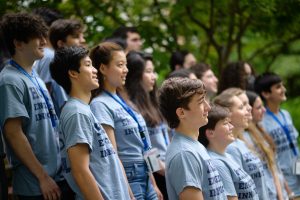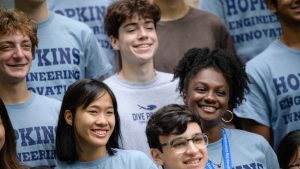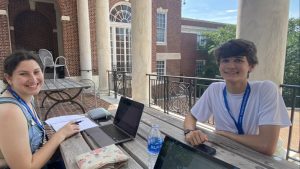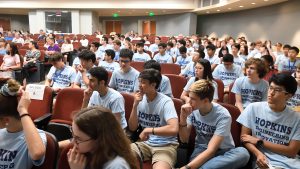Mission
Johns Hopkins Engineering innovation (EI) Pre-college Programs are high quality, challenging courses for diverse high school students in a supportive and dynamic environment. We introduce students to engineering, improve their college-readiness, and prepare them to succeed in engineering and other STEM fields.
Why choose Johns Hopkins Engineering Innovation?
- The curriculum is developed by educators at Johns Hopkins University
- Students have the potential to earn college credit
- Students learn to test and solve real-world problems
- Hands-on projects and labs provide engaging learning experiences
- 12:1 student-teacher ratio
Vision
Change the face of engineering by inspiring a diverse and inclusive population of students to become engineers.
History
Johns Hopkins Engineering Innovation Pre-College Programs has offered Explore Engineering Innovation (EEI) at locations across the United States since 2006. EEI is offered in-person as a residential and commuter summer pre-college program and became available online in 2021. During this program, high school students explore multiple engineering fields, including civil, chemical, mechanical, electrical, computer, and materials science.
As of 2023, EEI has served over 6,100 bright and curious high school students who are passionate about math, science and technology. EEI has hosted:
- 10% Black or African American students
- 12% Latino/Hispanic students
- 30% Women-identifying students
Through partnerships with Upward Bound, Minds Matter, Schuler Scholars, corporate partners, and other community-based organizations, 30% of EEI’s students have received scholarships to attend the course.
In the spring of 2019, Engineering Innovation launched Biomedical Engineering Innovation (BMEI), where high school students dive into modeling biological systems and designing experiments to test them. BMEI is an online course designed by the faculty of the nation’s number one biomedical engineering program and is available during the summer and fall. Since its launch, BMEI has served 760 high school students.
In 2023, Engineering Innovation introduced Sustainable Energy Engineering (SEE). During this program, high school students build an understanding of sources of energy, energy storage, and transfer, and the impact of social and political factors on sustainable energy today and beyond. SEE is available as a residential and commuter summer pre-college program. Its first cohort included 39 students.
Who creates our courses?
EEI was developed by Michael Karweit, PhD, a senior lecturer in Johns Hopkins Department of Environmental Health and Engineering, with the assistance of his colleagues. Based on the “What is Engineering?” undergraduate engineering course, the curriculum has been updated most recently by Claire VerHulst, PhD ‘15, in her role as Assistant Director of Engineering Innovation.
BMEI was developed by Eileen Haase, PhD, a senior lecturer, director of the undergraduate program in JHU’s Department of Biomedical Engineering, and director of the Johns Hopkins University Applied Biomedical Engineering Program at Hopkins Engineering for Professionals Programs, and Brock Wester PhD, project manager and section supervisor for the Applied Neuroscience area in the Intelligent Systems Group of the Johns Hopkins University Applied Physics Laboratory’s Research and Exploratory Development Department and vice chair of the Applied Biomedical Engineering Program at in the Engineering for Professionals Programs.
SEE was developed by Rachel Sangree, PhD, an associate teaching professor in the JHU’s Department of Civil and Systems Engineering, and Claire VerHulst, PhD ‘15, in collaboration with the Ralph O’Connor Sustainable Energy Institute (ROSEI).
Whiting School of Engineering Diversity and Inclusion Statement
The Whiting School of Engineering is a diverse and inclusive community that values:
- A scholarly, collaborative, and entrepreneurial environment in which innovation, creativity, risk-taking, and the ethical practice and applications of engineering and technology are paramount.
- The importance of both the fundamentals of engineering and the creation and dissemination of transformative knowledge contributing to the betterment of society.
- The members’ intellectual agility and their capacity to draw upon their wide range of technical and non-technical skills and abilities to solve societal problems.
John Hopkins University Diversity and Inclusion Statement
Johns Hopkins is a community committed to sharing values of diversity and inclusion in order to achieve and sustain excellence. We firmly believe that we can best promote excellence by recruiting and retaining a diverse group of students, faculty, and staff and by creating a climate of respect that is supportive of their success. This climate for diversity, inclusion, and excellence is critical to attaining the best research, scholarship, teaching, health care, and other strategic goals of the Health System and the University. Taken together these values are recognized and supported fully by the Johns Hopkins Institutions leadership at all levels. Further, we recognize that the responsibility for excellence, diversity, and inclusion lies with all of us at the Institutions: leadership, administration, faculty, staff, and students.
Begin Your Engineering Journey Here
Take a sneak peek into Hopkins approved online and on-campus short-term course options that fit your learning style.
Summer 2023
-

222 Residential Explore Engineering Innovation Students
JHU Homewood & Hood College campuses
-

45Commuting Explore Engineering Innovation Students
JHU-APL; JHU Homewood; Hood College
-

208Online Explore Engineering Innovation Students
-

182International Explore Engineering Innovation Students
-

475Total Explore Engineering Innovation Students
In-Person and Online
-

114Total Biomedical Engineering Innovation Students Online
-

46International Biomedical Engineering Innovation Students
-

39 Residential & Commuter Sustainable Energy Engineering Students
JHU Homewood & Hood College campuses








